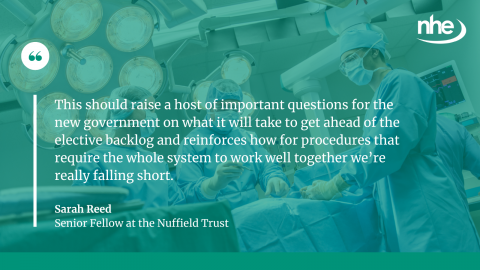New waiting time analysis from the Nuffield Trust indicates that England is lagging behind other high-income countries in its recovery from the Covid-19 pandemic.
The average waiting times for hip and knee replacements rose more substantially compared to countries like Spain and Finland and remained high into 2023.
The think tank points to structural vulnerabilities that predate the pandemic as the reason for the lack of progress compared to other countries.
These include:
- fewer hospital beds;
- lower numbers of key staff; and
- lower levels of investment in buildings and equipment.
“Health systems all over the world are still dealing with the effects of the Covid-19 pandemic, with many still struggling to bring down waiting times,” said Sarah Reed, senior fellow at the Nuffield Trust.
“However, it’s striking that in England our pace of recovery has been much slower for major surgeries like hip and knee replacements, but for some minor procedures we appear to have improved more quickly than nearly everywhere else.”

The uplift refers to cataract surgeries — waiting times for this procedure have improved quicker than most other comparable countries. The Nuffield Trust puts this down to orthopaedic surgeries requiring overnight stays and more support staff.
In the analysis, which looked at the 2017-2023 period specifically, the average waiting times for hip replacements increased from approximately 87 days prior to 2020 to 180 days in 2020. This dropped to 128 days in the subsequent three years but is still 50% longer than the pre-2020 figure.
Commonwealth countries like Australia and Canada have also recovered poorly, while Scandinavian countries Norway and Sweden have also seen increases in waits but to a lesser degree than in England. Little change has been observed in Spain and Finland from before and after the pandemic.
For knee replacements, waits in England stood at 91 days before the pandemic and rose to 209 during 2020. This stabilised at 142 days in the three years after. In countries such as Spain, Italy, Portugal and Finland, post-pandemic waits are either similar or shorter than those seen before Covid.
The think tank emphasises, however, that while the change in waits before and after the pandemic reflects poorly on England, the actual amount of time people wait for treatment is shorter in England than several other nations.
Responding to the analysis, Rory Deighton, who is the NHS Confederation’s acute network director, said: “The NHS also entered the pandemic following years of underinvestment, with waiting lists already on the rise.
“But despite the incredibly hard work of health leaders and their teams the health service has not made the kind of progress on clearing waiting lists as many would have liked.”
He continued: “These long waits have a huge impact on patients, who are often waiting in pain or discomfort. But as the analysis points out, stable waiting lists in other countries could mask issues around fewer referrals or more difficult patient access.”
The NHS Confederation also spotlights the industrial action as an influencing factor — it is estimated that 1.5 million appointments and procedures have been cancelled since they began, costing the NHS billions.
New health secretary Wes Streeting has made ending the strikes a priority and has already met with the British Medical Association’s junior doctors committee, with another meeting set for next week.
Sarah Reed added: “This should raise a host of important questions for the new government on what it will take to get ahead of the elective backlog and reinforces how for procedures that require the whole system to work well together we’re really falling short.”
Image credit: iStock



















